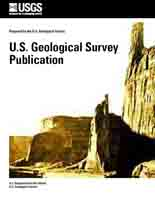The U. S. Geological Survey (USGS) conducted a coal resource assessment of several
areas in Armenia from 1997 to 1999. This report, which presents a prefeasibility study of the
economic and mining potential of one coal deposit found and studied by the USGS team, was
prepared using all data available at the time of the study and the results of the USGS exploratory
work, including core drilling, trenching, coal quality analyses, and other ongoing field work.
On the basis of information currently available, it is the authors? opinion that a small surface
coal mine having about a 20-year life span could be developed in the Antaramut-Kurtan-Dzoragukh
coal field, specifically at the Dzoragukh site. The mining organization selected or created to
establish the mine will need to conduct necessary development drilling and other work to establish
the final feasibility study for the mine. The company will need to be entrepreneurial, profit oriented,
and sensitive to the coal consumer; have an analytical management staff; and focus on employee
training, safety, and protection of the environment. It is anticipated that any interested parties will be
required to submit detailed mining plans to the appropriate Armenian Government agencies.
Further development work will be required to reach a final decision regarding the economic
feasibility of the mine. However, available information indicates that a small, economic surface
mine can be developed at this locality. The small mine suggested is a typical surface-outcropstripping,
contour mining operation. In addition, auger mining is strongly suggested, because the
recovery of these low-cost mining reserves will help to ensure that the operation will be a viable,
economic enterprise. (Auger mining is a system in which large-diameter boreholes are placed
horizontally into the coal seam at the final highwall set as the economic limit for the surface mining
operation). A special horizontal boring machine, which can be imported from Russia, is required
for auger mining. Although auger-mining coal reserves do exist, the necessary development work
will further verify the extent of these reserves and all of the other indicated reserves.
The following items are based on the detailed study reported in this publication.
Initial investment.?Following an investment of US $85,000 over a 12-month period in
mine development drilling and other activities, a decision must be taken regarding further
investment in an ongoing mining operation. If the new data support the opening of the surface mine,
__________________________
1Consultant, 6024 Morning Dew Drive, Austin, TX 78749.
2 U.S. Geological Survey, 956 National Center, Reston, VA 20192
1
2 MINABILITY AND ECONOMIC VIABILITY, ANTARAMUT-KURTAN-DZORAGUKH COAL FIELD
the $85,000 development cost is amortized over the first 10 years of mine production. If the new
data do not support the opening of the mine, the $85,000 is considered a business development
expense that may be written off against profits from other operations for income or other tax
purposes or simply as a business loss.
Total capital required.?The equipment costs will reach a total of $900,500 which will be
amortized over a 7-year period to establish estimated coal mining costs. Estimated working capital
costs are $300,000, which will be borrowed.
Surface mining reserves.?Approximately 840,200 metric tonnes of surface minable coal
reserves at 9.3 m3 of overburden per metric tonne of minable coal is indicated. Recovery of the
minable coal at 85 percent will yield 714,000 recoverable metric tonnes of marketable as-mined
coal.
Auger mining reserves.?Auger-mining reserves of 576,000 metric tonnes are indicated.
Recoverable auger-mining reserves of 202,000 metric tonnes (at 35-percent recovery) can be
expected. Auger-mining production will vary according to the hole size being used, but, in either
case, augering is a very profitable addition to the mining oper


